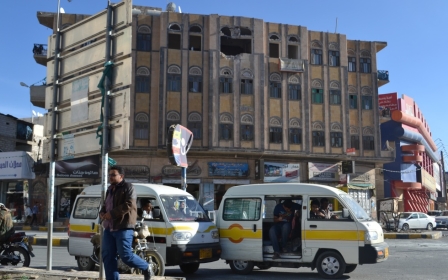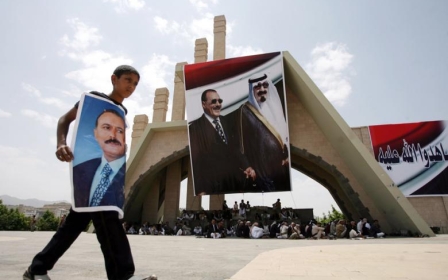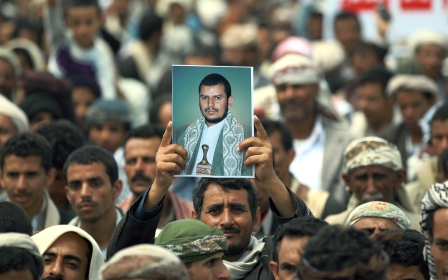Fears of a crackdown in Yemen as Houthi supporters disperse rally

Supporters of Yemen’s Houthi movement dispersed a student-led protest on Monday, attacking several demonstrators with knives and sticks and detaining three, including a prominent anti-government activist, after they took to the streets to denounce the Shiite movement’s seizure of the capital.
The attack on the protest – organised by activists in response to the resignation of President Abd Rabbuh Mansour Hadi last week when Houthi militiamen kidnapped his chief of staff and seized key buildings – has raised fears about growing instability in Yemen and the prospect of a widening crackdown on dissent by the Houthi group.
Yemen’s parliament postponed a session to consider the resignation of Hadi who is seen by the region and the US as a key ally against al-Qaeda in the Arabian Peninsula (AQAP).
On Monday students who gathered by Sana’a University, the site of protests that toppled former president Ali Abdullah Saleh in 2011, to denounce what they called last week’s “coup” against Hadi, said they were attacked by Houthi supporters after they refused to end their sit-in.
“When we refused to leave, they attacked us with sticks and Jambiyas (a curved dagger usually worn as a clothing accessory),” Baraa Shiban, a project co-ordinator with Reprieve, who took part in the anti-Houthi rally, told Middle East Eye.
“I saw a young woman who was being beaten, when I tried to pull her back, they hit me with sticks,” he said.
The Houthi supporters, some of whom, Shiban said, were dressed in uniform and chanting the group’s slogan: “Death to America, Death to Israel, Curse the Jews, Victory to Islam” detained three demonstrators, including a photographer Yahya al Siwar and activist, Adel Shamsan, bundling them into the back of an armoured vehicle.
Shiban and other activists at the rally were quick to compare the dispersal to similar violent tactics used by supporters of former President Ali Abdullah Saleh during anti-government protesters in 2011.
“It’s like reliving 2011,” said Sara Jamal, a sociology student and activist. “The student movement is small but solid, nonviolent and non-sectarian. Right now it’s our only hope.”
Activists who launched the so-called Arab Spring uprising, say they have grown disillusioned with the 2012 political transition agreement brokered by the US and Saudi Arabia meant to usher in stability and democracy in Yemen.
On Monday a group of activists petitioned the government to reject Hadi’s resignation, warning of an impending civil war that would end Yemeni “aspirations for a civil state”.
“This (the Houthi takeover of Sanaa) has undermined the last trace of the state’s legitimacy that represents and brings Yemenis together,” read the statement signed by over 50 Yemen writers, rights activists and organisers.
“Such events have taken Yemen to a dark path where tools of violence get to decide the country’s fate, .. this path enhances the chances of civil war and fragmentation along sectarian and regional lines”.
Hadi tendered his resignation on Thursday along with Prime Minister Khalid Bahah, saying he could not stay in office as the country was in "total deadlock".
The crisis had escalated on January 17 when the Houthis seized Hadi's chief of staff, Ahmed Awad bin Mubarak, in an apparent bid to extract changes to a draft constitution.
Pitched battles then erupted in the capital, with the Houthis seizing the presidential palace and firing on Hadi's residence in what authorities said was a coup attempt.
The Houthis, who descended from their base in Yemen's rugged north to overrun the capital in September, have yet to release bin Mubarak.
On Sunday, the Houthis detained several activists and two reporters from local media at the protest, but the journalists were released after signing pledges not to cover demonstrations, according to an activist, Mohammed al-Saadi.
The unrest has raised fears of strategically important Yemen, which lies next to oil-rich Saudi Arabia and along key shipping routes, collapsing into a failed state.
Drones still flying
Meanwhile a security official in Yemen said the US carried out its first drone strike in the country since Hadi resigned.
They say the strike Monday on a vehicle in an area called Hareib, located between the provinces of Marib and Shabwa, killed three suspected al-Qaida militants.
Yemeni authorities have long allowed the United States to carry out drone attacks against al-Qaeda in the Arabian Peninsula (AQAP), considered by Washington as the jihadist network's most dangerous branch.
US President Barack Obama on Sunday vowed to keep pursuing AQAP despite the crisis, saying “we will continue to maintain the pressure that is required to keep the American people safe.”
New MEE newsletter: Jerusalem Dispatch
Sign up to get the latest insights and analysis on Israel-Palestine, alongside Turkey Unpacked and other MEE newsletters
Middle East Eye delivers independent and unrivalled coverage and analysis of the Middle East, North Africa and beyond. To learn more about republishing this content and the associated fees, please fill out this form. More about MEE can be found here.




